Politburo of the Communist Party of Vietnam
The Political Bureau (Politburo) of the Central Committee Communist Party of Vietnam (Vietnamese: Bộ Chính trị Ban Chấp hành Trung ương Đảng Cộng sản Việt Nam), formerly the Standing Committee of the Central Committee from 1930 to 1951, is the highest body of the Communist Party of Vietnam (CPV) between Central Committee meetings, which are held at least twice a year. According to Party rules, the Politburo directs the general orientation of the government and enacts policies which have been approved by either the National Party Congress or the Central Committee.
Political Bureau Bộ Chính trị | |
|---|---|
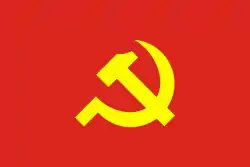 | |
| Leadership | |
Status | Highest CPV body between Central Committee plenums |
1st-ranked member | Nguyễn Phú Trọng |
Elected by | Central Committee |
Responsible to | Central Committee |
| Seats | 18 (see 13th Politburo) |
The members of the Politburo are elected (and given a ranking) by the Central Committee in the immediate aftermath of a National Party Congress. The current Politburo, the 13th, was elected by the Central Committee in the aftermath of the 13th National Congress and consists of 18 members. The first-ranked member is General Secretary of the Central Committee.
Duties and responsibilities
The Politburo is a subunit of the Central Committee, the supreme organ on party affairs. The members of the Central Committee, when the Party Congress has ended, freely elects the composition of the Politburo.[1] The number of Politburo members is also decided by the Central Committee membership.[2] Until 1990, there were two different forms of Politburo membership: full and alternate. When the Secretariat was abolished in 1996, a short-lived Politburo Standing Committee (also known as the Politburo Standing Board) was established.[3] Unlike the Secretariat, the Politburo Standing Committee was appointed by the Politburo and not the Central Committee (although the two bodies had nearly-identical functions). The Politburo Standing Committee was abolished in 2001 at the 9th National Congress, and the Secretariat was reestablished.[4] Elected members are given rankings in an order of precedence.[5]
The Politburo is the leading organ on Party affairs; the Central Committee convenes only twice a year, but the Politburo can implement policies which has been approved by either the previous Party Congress or the Central Committee. It is the duty of the Politburo to ensure that resolutions of the Party Congress and the Central Committee are implemented nationally. It is also responsible for matters related to organisation and personnel, and has the right to prepare (and even convene) a Central Committee plenary session.[1] The Politburo can be overruled by the Central Committee, as happened in 2001 when the Politburo voted in favour of retaining Lê Khả Phiêu as General Secretary; the Central Committee responded by overturning the Politburo decision, dismissed Lê from active politics altogether, and forced the Central Committee to elect a new General Secretary after the 9th National Congress.[6]
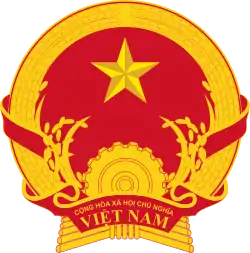 |
|---|
| This article is part of a series on the politics and government of Vietnam |
|
|
Meetings are held regularly; decisions within the Politburo are made through collective decision-making, which means that policies are only enacted if a majority of Politburo members support them.[1] In the 1960s, outside analysts believed the Politburo was divided into two factions (pro-China and pro-Soviet); this forced Politburo members to decide policy through compromise. This was later proven wrong, because Hồ Chí Minh became a staunch believer in collective decision-making during the 1950s after the beginning of de-Stalinisation in the Soviet Union.[7] Hồ's successor, Lê Duẩn, stated at the 4th National Congress that "Only with collective decisions made by collective intelligence will we be able to avoid subjectivism that leads to errors and sometimes to dangerous consequences".[8] Hồ's emphasis on the maintenance of unity led the Party to eschew the Communist Party of China's (CPC) policy of "criticism and self-criticism".[9] The CPC's criticism and self-criticism policy was used to resolve "internal contradictions"; the problem with this concept was that it always assumed that one side was right.[9] "Criticism and self-criticism" was not introduced in Vietnam, chiefly for this reason.[9]
However, Zachary Abuza (author of Renovating Politics in Contemporary Vietnam) claims that Politburo decision-making is built on factional infighting and ideological differences rather than on any notion of collective leadership.[3] The Politburo is responsible to the Central Committee, and the Central Committee can question the Politburo. The composition of the Central Military Commission, the leading Party organ on military affairs, is decided by the Politburo. It is the responsibility of the Secretariat (not the Politburo) to ensure the implementation of directives stemming from the Politburo.[1]
Power in relation to the state
Before the reforms of Nguyễn Văn Linh during the late 1980s, the Politburo was the supreme decision-making organ in all areas of party and state. Before 1988, the Politburo had no clear guideline on its responsibilities on socioeconomic issues. Because of this lack, the Politburo frequently meddled in the affairs of the Council of Ministers (the central government). Until 1988, the Politburo made detailed planning and budgetary decisions; from 1988 onwards, the Politburo decides a plan's general orientation, but lets the central government make detailed socioeconomic decisions. The all-encompassing role of the Politburo before 1988 blurred the roles of the party and state in the decision-making process. Another problem until 1988 was that many members of the Politburo were leading officials within the state (again blurring the roles of party and state).[10]
The Politburo has the unofficial power to appoint members of the central government through the National Assembly of Vietnam. Because the National Assembly is dominated by the party, party leadership has considerable leverage in appointing members of the central government. However, even if the Politburo decides the appointment of officials, party members can oppose the nominees; the appointment of Đỗ Mười was opposed by the Club of Resistance Veterans, a group of reformist communist cadres.[11]
Current members
The current 18-member Politburo was elected on January 31, 2021 at the first plenum of the 13th Party Central Committee.[12] Nguyễn Phú Trọng was re-elected for his third term as General Secretary of the Communist Party of Vietnam, a position he has held since 2011.[13]
| ☭ The 13th Politburo of the Communist Party of Vietnam Central Committee ☭ | |||||
|---|---|---|---|---|---|
| Rank | Incumbent | Date and place of birth | Position(s) in the Communist Party of Vietnam | Office(s) | |
| 1 | 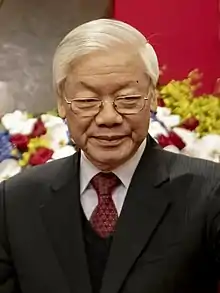 |
Nguyễn Phú Trọng | April 14, 1944 Đông Anh, Hanoi |
General Secretary |
President |
| 2 | 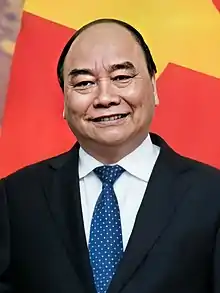 |
Nguyễn Xuân Phúc | July 20, 1954 Quế Sơn, Quảng Nam |
Standing Member of the Central Military Commission |
Prime Minister |
| 3 | 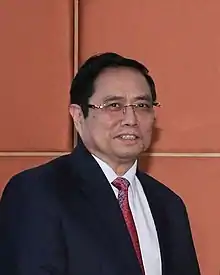 |
Phạm Minh Chính | December 10, 1958 Hậu Lộc, Thanh Hóa |
Head of the Central Organizing Commission | |
| 4 | 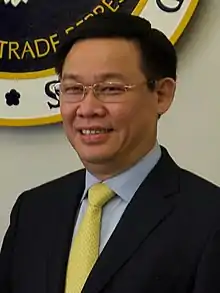 |
Vương Đình Huệ | March 15, 1957 Nghi Lộc, Nghệ An |
Secretary of the Hanoi Party Committee | |
| 5 |  |
Trần Tuấn Anh | April 6, 1964 Đức Phổ, Quảng Ngãi |
Deputy Head of the Central Economic Committee | Minister of Industry and Trade |
| 6 | Nguyễn Hòa Bình | May 24, 1958 Nghĩa Hành, Quảng Ngãi |
Chief Justice of the Supreme People's Court | ||
| 7 | 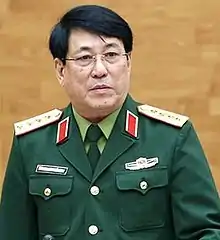 |
Lương Cường | August 15, 1957 Việt Trì, Phú Thọ |
Standing Member of the Central Military Commission | Director of the Vietnam People's Army General Political Department |
| 8 | Đinh Tiến Dũng | May 10, 1961 Hoa Lư, Ninh Bình |
Minister of Finance | ||
| 9 |  |
Phan Văn Giang | October 14, 1960 Nam Trực, Nam Định |
Standing Member of the Central Military Commission |
First Deputy Minister of Defence |
| 10 | 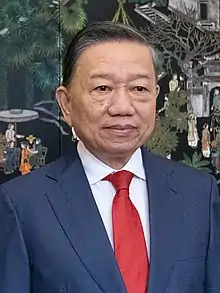 |
Tô Lâm | July 10, 1957 Văn Giang, Hưng Yên |
Minister of Public Security | |
| 11 | Trương Thị Mai | January 23, 1958 Quảng Ninh, Quảng Bình |
Head of the Central Mass Mobilization Commission | ||
| 12 | Trần Thanh Mẫn | August 12, 1962 Châu Thành A, Hậu Giang |
Chairman of the Vietnamese Fatherland Front Central Committee | ||
| 13 |  |
Phạm Bình Minh | March 26, 1959 Vụ Bản, Nam Định |
||
| 14 |  |
Nguyễn Văn Nên | July 14, 1957 Gò Dầu, Tây Ninh |
Secretary of the Ho Chi Minh City Party Committee | |
| 15 | Nguyễn Xuân Thắng | February 18, 1957 Thanh Chương, Nghệ An |
Chairman of the Central Theoretical Council |
||
| 16 | Võ Văn Thưởng | December 13, 1970 Mang Thít, Vĩnh Long |
Head of the Central Propaganda Department | ||
| 17 | Phan Đình Trạc | August 25, 1958 Diễn Châu, Nghệ An |
Head of the Internal Affairs Commission | ||
| 18 | Trần Cẩm Tú | August 25, 1961 Hương Sơn, Hà Tĩnh |
Chairman of the Central Inspection Commission | ||
References
Citations
- Staff writer. "Điều lệ Đảng Cộng sản Việt Nam thông qua tại Đại hội đại biểu toàn quốc lần thứ XI của Đảng" [Statute of the Communist Party of Vietnam which was approved at the 11th National Congress]. 11th National Congress of the Communist Party of Vietnam. Archived from the original on 25 January 2013. Retrieved 23 June 2012.
- Stern 1993, pp. 3–4.
- Abuza 2001, p. 19.
- Jeffries 2006, p. 21.
- "Party Congress announces CPVCC Politburo members". Government of the Socialist Republic of Vietnam. 19 January 2011. Retrieved 24 June 2012.
- Abuza, Zachary (16 November 2001). "The Lessons of Le Kha Phieu: Changing Rules in Vietnamese politics". Vietnamese Professionals of America. The Catholic University of America: 12. Cite journal requires
|journal=(help) - Porter 1993, p. 114.
- Porter 1993, pp. 114–115.
- Porter 1993, p. 115.
- Porter 1993, p. 83.
- Porter 1993, p. 84.
- "BREAKING NEWS: LIST OF NEWLY-ELECTED POLITBURO MEMBERS". Government of the Socialist Republic of Vietnam. 31 January 2021. Retrieved 31 January 2021.
- "Vietnam's Party General Secretary Nguyen Phu Trong wins re-election". Tuổi Trẻ. 31 January 2021. Retrieved 31 January 2021.
Sources
- Abuza, Zachary (2001). Renovating Politics in Contemporary Vietnam. Lynne Rienner Publishers. ISBN 978-1555879617.
- Jeffries, Ian (2006). Vietnam: A Guide to Economic And Political Developments. Taylor & Francis. ISBN 978-0415392143.
- Porter, Gareth (1993). Vietnam: The Politics of Bureaucratic Socialism. Cornell University Press. ISBN 978-0801421686.
- Stern, Lewis (1993). Renovating the Vietnamese Communist Party: Nguyen Van Linh and the Programme for Organizational Reform, 1987–91. Institute of Southeast Asian Studies. ISBN 978-9813016552.